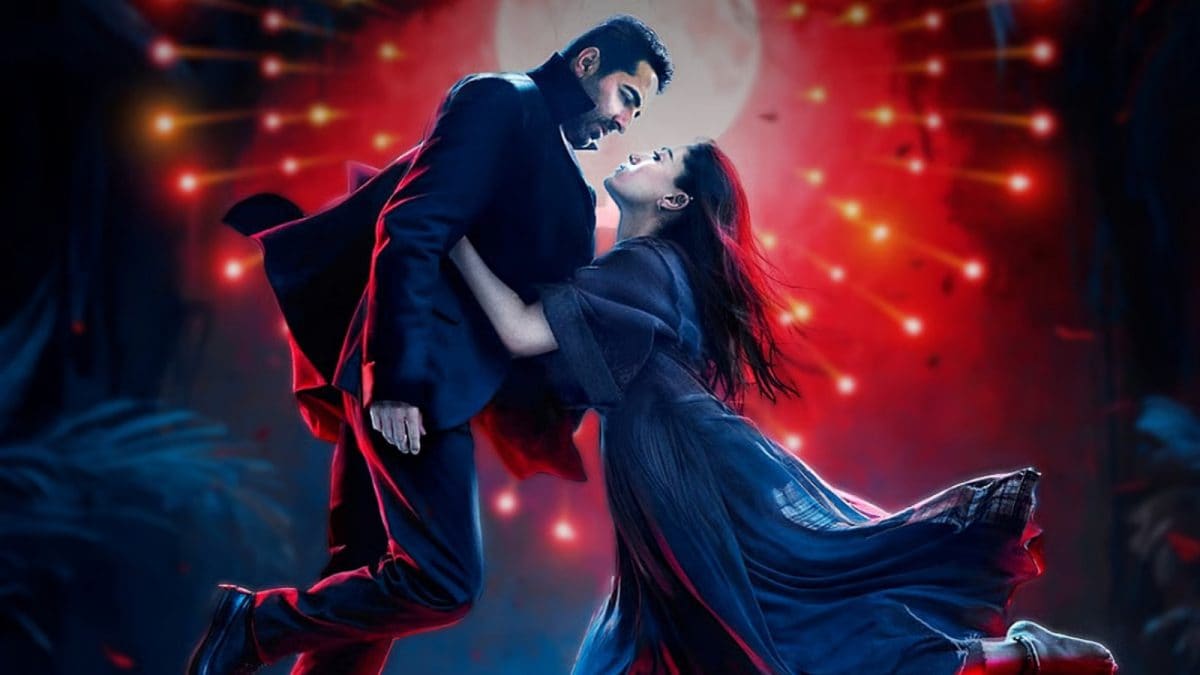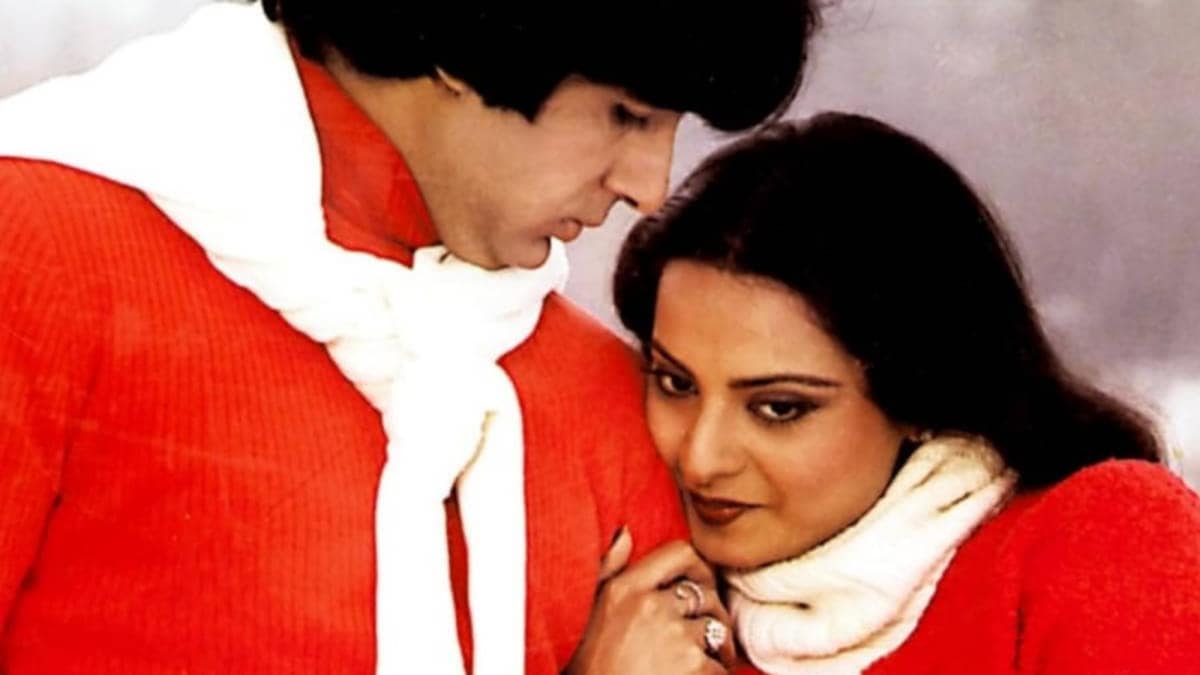Last Updated:
It’s a delight to see Ayushmann Khurrana back on the big screen after more than two years. He’s sincere and delivers a competent turn but the role doesn’t quite stretch his range.

Thamma is currently running in theatres.
ThammaU/A
3/5
Starring: Ayushmann Khurrana, Nawazuddin Siddiqui, Rashmika Mandanna and Paresh RawalDirector: Aditya SarpotdarMusic: Sachin-Jigar
Thamma Movie Review: First, we met a female spirit who turned the usual gender narrative on its head. A werewolf followed her. Then came the ghost of a boy who died after his munj ceremony and later, a headless phantom. So, why should benevolent vampires be left behind? The Maddock Horror Comedy Universe (MHCU) took their assignment rather seriously and now, Thamma has come into being. Novel, right? Yes, it was. But it’s this need for novelty that throws down the gauntlet to MHCU. The result? Thamma struggles under the weight of the lofty ambitions and conventional tropes of its own universe.
The Aditya Sarpotdar directorial opens with a sequence in 323 BC. Alexander The Great, also known as Sikandar, sets foot into the woods with his people and one of his entourage members cautions him about ‘insaanon ka khoon peene waala’ Betal. When the emperor pays no heed to his words, the omnipotent Betal descends and attacks him. The action then shifts to the present day when a reporter named Alok treks into the same forest with a couple of his peers. But soon, a bear chases him down and injures him.
When Alok almost succumbs to his destiny of being killed by a bear, Tadaka, a forest girl, comes to his rescue and protects him. It’s then revealed that she too is a member of the Betal community, that thrives on fresh blood. The leader of the community is Yakshasan, who had also sucked Alexander’s blood out. He has been held captive in a hill. Yakshasan and his followers look like humans but they hardly are. They’re immortal but don’t have a beating heart. However, there’s a conflict between him and Tadaka.
While the former still craves for human blood, Tadaka has decided to stay away from it after an epiphany hit her during the riots of 1947. She realised that humans are after all evil entities who carry venom and animosity in their hearts. Cut to the present day, Tadaka protects Alok from the clutches of Yakshasan and they go back to city life where Alok’s father senses something suspicious about him. During a tiff between Alok and a bunch of other Delhi boys, Tadaka’s fangs come out and she ends up bruising and fighting them.
One thing leads to another and a tragic event leads Alok to become a vampire. Together, they fight Yakshasan and attempt to bring back principles, ethics and morality to the community of Betals. What’s interesting about Thamma is that here, for a change, we’ve a woman with a saviour complex. Tadaka magically pops up during all kinds of pandemonium and rescues Alok from danger and bad guys and even when he locks horns with Bhediya. Yes, there are cameos by Varun Dhawan as Bhediya and Abhishek Banerjee as Jana.
And once again, Jana hits the ball out of the park with his impeccable and effortless comic timing. His Dame Un Grrr and good actors being a ‘rare species’ jokes will crack you up. The same, unfortunately, cannot be said about the writing of Thamma. The makers try their best to incorporate one-liners and repartees in the script but they hardly ever land. There are references made to Dilwale Dulhaniya Le Jayenge and meta jokes on Ayushmann Khurrana too.
There’s a dialogue, ‘Jeele apne maut ki baad ki zindagi’. In another scene, Alok’s father blesses him, saying, ‘Aayushman bhava’. All they do is elicit indifference. At this point, the films of the MHCU almost feel like a jaded template with check boxes that must be ticked at all costs. So, there are funny moments, some jump scares, some fights laced with VFX and some family friction. Thamma, naturally, is no exception but the problem is that hardly any of these tropes work.
In one of its earlier scenes, Alok is being chased by a bear born out of VFX. It’s so evidently artificial that you end up laughing and then find yourself squirming. The same can be said about the sequence where Alok’s Thamma and Bhediya are clawing at each other atop a building in Delhi. But the special effects-heavy and in-your-face use of VFX, though looks polished, robs the action of its grit, diluting its raw physicality. Even the jump scares don’t startle you and lose their intended impact.
Underneath the veil of the myth, the folklore and the supernaturalism, it’s Tadaka and Alok’s love story that forms the heart of the narrative. It’s the driving force of the tale but that heavily suffers due to the writing. As a result, it lacks the intensity and rawness that could’ve otherwise elevated the screenplay. At 2 hours 30 minutes, Thamma often ends up feeling too stretched. A taut, crisper storytelling perhaps could’ve saved the day. As for the performances, Ayushmann gives it his all as Alok.
It’s a delight to see him back on the big screen after more than two years. He’s sincere and delivers a competent turn but the role doesn’t quite stretch his range. However, thanks to his acting instincts, he holds his ground even when the writing doesn’t fully support him. As for Rashmika Mandanna, it’s a space she hasn’t traversed before. Her Tadaka is quietly simmering and enigmatic. The makers play to her strengths and offer her a role that fits her well. Her minimalism works here as Tadaka is a character that thrives on emotional restraint.
Paresh Rawal returns to a zone he’s immensely loved for – comedy. However, his timing and instincts feel wasted. Nawazuddin Siddiqui as Yakshasan and the original Thamma is interesting. But he too suffers due to an under-cooked character with no layers. Sathyaraj returns as Elvis, the quirky paranormal expert, whose conversation with Jana stands out. He also forms an integral link between Thamma and Bhediya. Nora Fatehi’s cameo in Dilbar Ki Aankhon Ka isn’t just restricted to that of a dancer. She too is an important part of this folklore world.
Thamma was capable of so much more. This is the first time that a mainstream Hindi film is exploring the myths surrounding vampires. Yes, there’s masala, loads of it. But MHCU’s earlier films had raised our expectations so high that by the end of Thamma, you’ll be left feeling high and dry. There was ample room for experimentation and there was so much potential to push boundaries and dare more. But ultimately, the storytelling remains curiously restrained and gets reduced to just another horror-comedy with tropes that arrive on cue.

Titas Chowdhury is a Principal Correspondent at News18 Showsha. She writes about cinema, music and gender in cinema. Interviewing actors and filmmakers, writing about latest trends in showbiz and bringing break…Read More
Titas Chowdhury is a Principal Correspondent at News18 Showsha. She writes about cinema, music and gender in cinema. Interviewing actors and filmmakers, writing about latest trends in showbiz and bringing break… Read More
October 21, 2025, 13:22 IST






